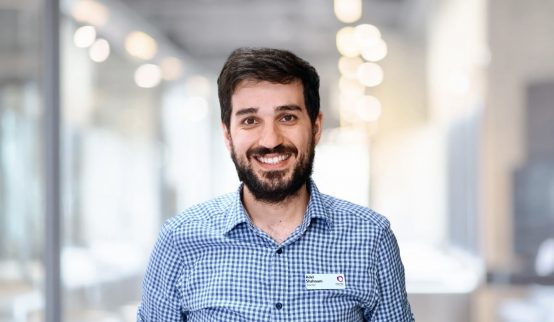
- Details
- Written by: Naomi Harrison
- Category: News
- Hits: 271
“There really is nowhere else like it.”
That’s how third-year oncology fellow Dr Adel Shahnam described Peter Mac after joining us in February.
After over a month in the role, Adel sat down with us to share what it’s like working in Australia’s largest Phase 1 Trials Unit.
“There are world leaders in oncology all around the organisation. These are the names you see presenting at international conferences everywhere, so to have the chance to work alongside them is just amazing,” Dr Shahnam explains.
“It can be quite intimidating to stand beside world renowned names in cancer care but everybody has been very approachable and happy to share their knowledge.
“As someone who wants to work in oncology and clinical trials it was the obvious place to apply to for my fellowship year.”
Through his role, Dr Shahnam is gaining insights into designing and constructing clinical trials while managing and supporting patients and their families.
“I’m finding that I’ve been inspired by the opportunity to work with and learn from the best,” he said.
“Peter Mac has a unique model of care that’s taken me some time to adjust to, but the support from the team and everyone I’ve met has been great.
“I’ve been fortunate enough to also do some work with sarcoma so having the option to focus on a sub-specialty at the same time as the trial work is a fantastic mix,” he said.
But the one thing Dr Shahnam wasn’t expecting to be so difficult? Melbourne’s weather.
“Everyone says the weather can be erratic and I can see what they mean,” he said.
“My first day down here it was 35 degrees in the morning and then by the afternoon it was raining!
“But Melbourne has so much to see and do. I’m really looking forward to exploring the city and the state and getting to know them better.”
Peter Mac has had a recent influx of doctors undertaking their fellowship year, as well as graduate nurses starting out their careers.
We’ll bring you some of their stories over the year as they embark on an exciting and rewarding careers in oncology at Peter Mac.
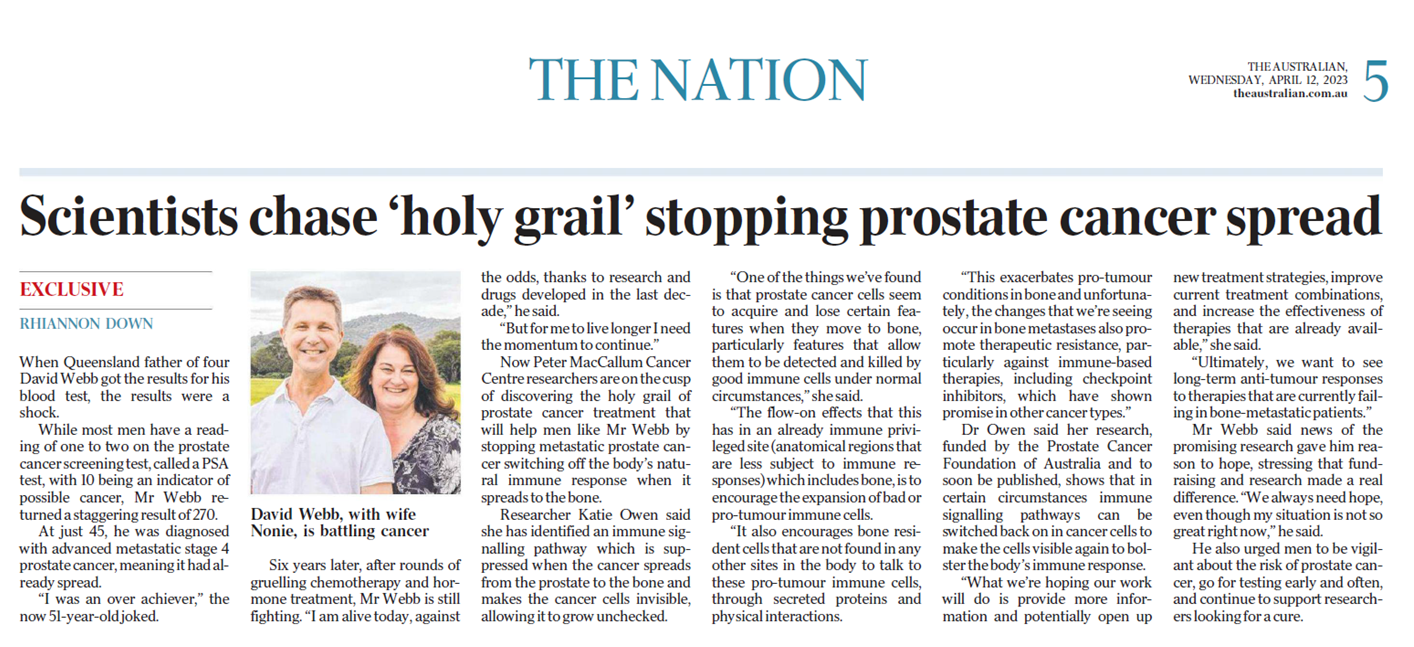
- Details
- Written by: Nadia Joulian
- Category: News
- Hits: 115
The Australian newspaper has described Peter Mac's research into stopping the spread of prostate cancer as a chase for the 'holy grail’

Dr Katie Owen is part of the Parker Laboratory team who have identified an immune signalling pathway that is suppressed when prostate cancer spreads to the bone and makes the cancer cells invisible to the body’s immune response.
"One of the things we've found is that prostate cancer cells seem to acquire and lose certain features when they move to bone, particularly features that allow them to be detected and killed by good immune cells under normal circumstances," Katie said.
"The flow-on effects that this has in an already immune privileged site (anatomical regions that are less subject to immune responses) which includes bone, is to encourage the expansion of bad or pro-tumour immune cells.
"This exacerbates pro-tumour conditions in bone and unfortunately, the changes that we're seeing occur in bone metastases also promote therapeutic resistance, particularly against immune-based therapies, including checkpoint inhibitors, which have shown promise in other cancer types,” she said.
The team’s work has shown that immune signalling pathways can be switched back on in cancer cells to make the cells visible again in certain circumstances, bolstering the body’s immune response.
The research has been funded by the Prostate Cancer Foundation of Australia and is soon be published.
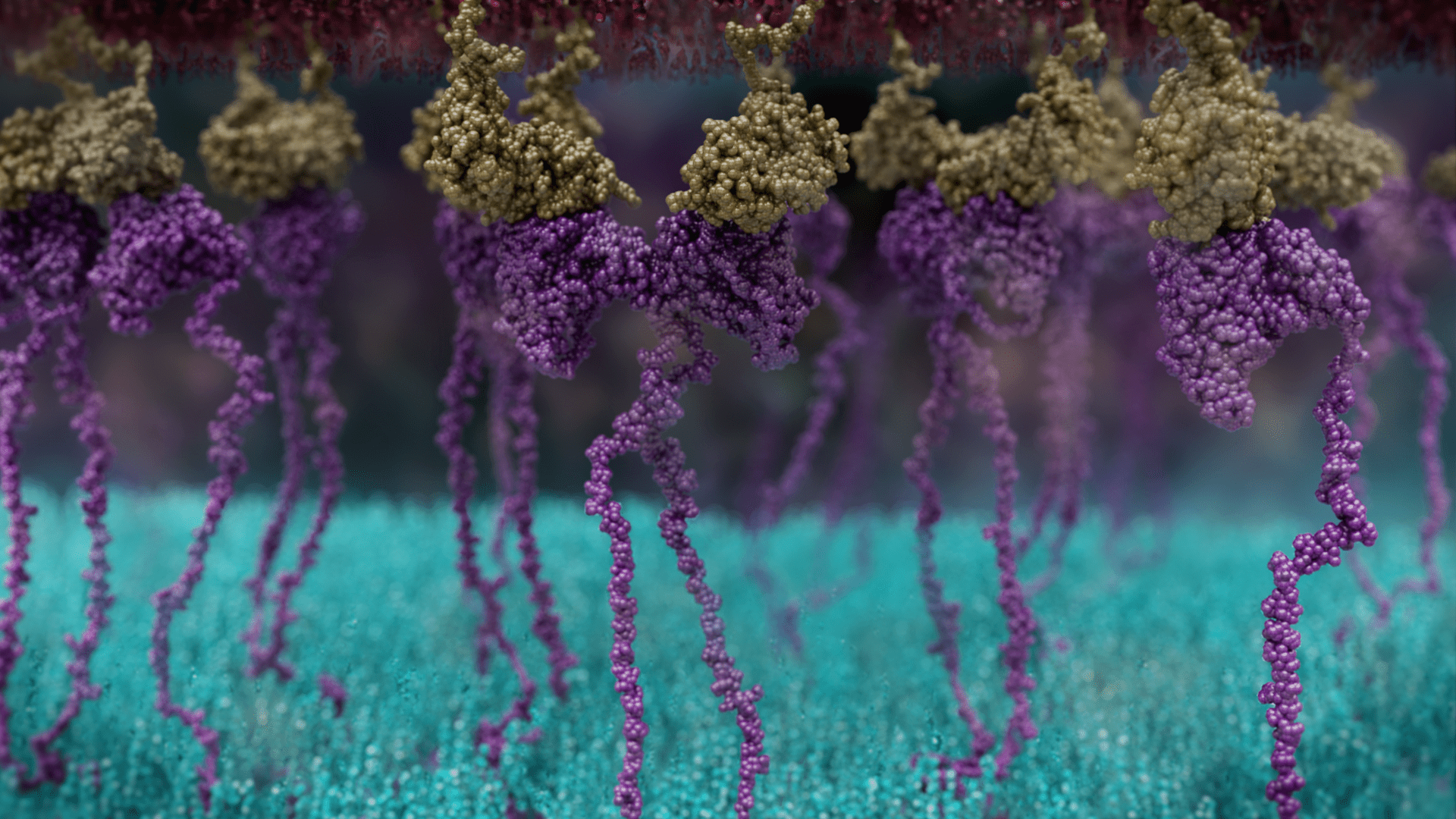
- Details
- Written by: Nadia Joulian
- Category: News
- Hits: 373
Peter Mac researchers have developed a new approach to chimeric antigen receptor (CAR) T-cell therapy which has proven effective in fighting solid cancer tumours.

CAR T-cell therapy is an innovative form of immunotherapy that uses naturally occurring T-cells which form an essential part of the body’s immune system to target and destroy infected cells. These T-cells are collected, re-engineered with the CAR receptor, and then re-infused as a once-off procedure to fight the cancer cells.
This latest Peter Mac-led study – published in Science Translational Medicine this week - uses younger, stem-like T-cells rather than conventional T-cells. In an exciting development, these cells, called T stem-like CAR T-cells, have shown an increased ability to reproduce when carrying the CAR receptor.
Peter Mac Human Immunology Translational Lab Head, Professor Paul Neeson, said this study is a major step towards CAR T-cell therapy being effective in solid cancers.
“While CAR T-cell therapy has been approved in some types of blood cancers like leukaemia, lymphoma and myeloma, the success of CAR T-cells in solid cancers is limited. This is due to factors including poor CAR T-cell expansion, persistence and exhaustion when fighting the tumour,” he said.
“Importantly, these T stem-like CAR T-cells have improved anti-tumour function in the culture dish and in four pre-clinical models. In fact, they completely eradicated pre-existing solid tumours when combined with the immune checkpoint drug anti-PD1.
“Furthermore, they persist long-term, indicating these cells have all the hallmark traits of CAR T-cells which have had outstanding success in blood cancers.”
The study first created a production protocol that generates fully functional stem-like CAR T-cells in an abbreviated six-day period instead of the standard 14 days, opening the door for a more cost-effective and scalable process in the future.
These significant results support the implementation of production strategies to generate stem-like CAR T-cells for clinical use.
“We would aim to use these cells in two paediatric leukaemias that are resistant to treatment. We believe our protocol will harmonise the CAR T-cell product to one that has consistent anti-tumour function and the important ability to persist,” Prof Neeson said.
“Once we show these cells are safe, we will turn our attention to developing this treatment for paediatric solid cancers including osteosarcoma and neuroblastoma.”
This research was conducted in collaboration with the Murdoch Children’s Research Institute, Zero Childhood Cancers, Children’s Cancer Institute Australia and a broad range of oncologists at Peter Mac.
Watch the video CAR-T Cells: Engineered Cancer Killers
Contacts:
For more information contact the Peter Mac Communications team on 0417 123 048.
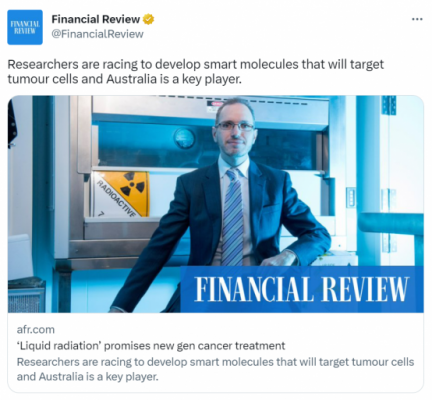
- Details
- Written by: Ashley Hibbert
- Category: News
- Hits: 164
The Peter Mac team that pioneered a new treatment for advanced prostate cancer, and was recently granted USD $10 million by the US' Prostate Cancer Foundation, is again making headlines.

The Australian Financial Review newspaper on the weekend published a feature article on the work of ProsTIC - the Prostate Theranostics and Imaging Centre of Excellence at Peter Mac.
The story explains how the injectable "liquid radiation" treatment - known as Lu-PSMA - travels through a patient's body and selectively binds to, and kills, prostate cancer cells wherever they are found.
The ProsTIC team - led by Professor Michael Hofman and including radiopharmaceutical scientist Dr Mohammad Haskali - is now working on a next-gen version that would be both more potent and targeted.
It hoped the next-gen treatment could be effective against a wide array of cancers, not only prostate cancer.
Quoted in the AFR story is Dr Howard Soule, who is executive vice president and chief science officer of the US Prostate Cancer Foundation.
Dr Soule recently flew from the US to Melbourne to check-in with the ProsTIC team and he told the AFR it was "everything you'd want to see from a philanthropic investment".
"It's not the largest radio-pharmacy in the world, but there is no more intelligent facility," Dr Soule says.
"It almost brings tears to my eye to see how far they have come in a relatively short period."
Dr Soule also notes the "research excellence at Peter Mac has been on our radar screen for a very long time".
Read the story in full - see the AFR story or via the AFR's twitter.
Read about the US PCF's US $10 million grant for Prostic as announcd in December last year - see the announcement.
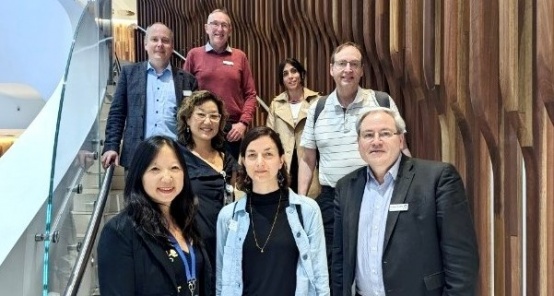
- Details
- Written by: Naomi Harrison
- Category: News
- Hits: 160
Peter Mac welcomed a delegation from Bonn University, Germany to collaborate on a new area of research in the field of artificial intelligence and radiomics.

Dr Hyun Ko, Radiologist and clinician researcher at Peter Mac said that radiomics is an emerging technique of extracting large quantities of additional data from medical images that cannot be appreciated by the naked eye.
“Another ground-breaking tool in medicine is the use of artificial intelligence to better understand the prognosis and progression of someone’s cancer,” said Dr Ko.
“It really is a new promising field in personalised and precision medicine,” she said.
Research projects in pancreatic cancer and cancer cachexia will be the first to use the expertise from Bonn University and Peter Mac’s clinical, research and artificial intelligence knowledge.
Dr Ko’s expertise in radiology and in radiomics and artificial intelligence aims to improve patient outcomes.
“Artificial intelligence can be divided into machine learning and deep learning,” said Dr Ko.
“Machine learning automates big data handling (large quantities of data) while deep learning takes big data analysis to a higher level by making new connections among factors that might otherwise not be made.
“It therefore might come up with new life-altering or even life-saving discovery because it was able to syphon through big data that humans are not capable to capture,” she said.
The collaboration between Peter Mac and Bonn University is a perfect match of skillsets said University Hospital of Bonn Director of Radiology, Prof Ulrike Attenberger.
“We have been building up our artificial intelligence expertise for the last three years and there is already a strong relationship with Peter Mac and Melbourne University so there is a large scope for many conjoint research opportunities,” she said.
The delegation saw four key representatives, led by the Dean of the medical faculty Prof Bernd Weber and Managing Director of experimental immunology Prof Christian Kurts from Bonn University tour Peter Mac research facilities while an additional group joined online to hear further about the proposed research projects.
We look forward to sharing the outcomes of this exciting new area of research in the future.
